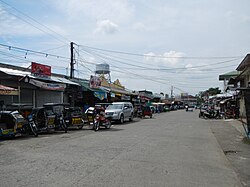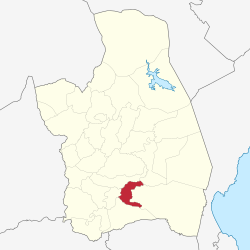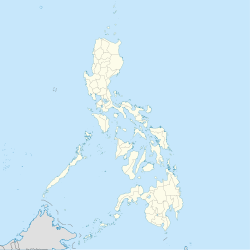| Learn more This article needs additional citations for verification. (October 2013) |
Peñaranda, officially the Municipality of Peñaranda (Tagalog: Bayan ng Peñaranda, Ilocano: Ili ti Peñaranda), is a municipality in the province of Nueva Ecija, Philippines. According to the 2020 census, it has a population of 32,269 people.[3]
Peñaranda
Mapisong | |
|---|---|
| Municipality of Peñaranda | |
 Downtown area | |
 Map of Nueva Ecija with Peñaranda highlighted | |
OpenStreetMap | |
Location within the Philippines | |
| Coordinates: 15°21′11″N 121°00′06″E / 15.3531°N 121.0017°E | |
| Country | Philippines |
| Region | Central Luzon |
| Province | Nueva Ecija |
| District | 4th district |
| Named for | José Maria Peñaranda |
| Barangays | 10 (see Barangays) |
| Government | |
| • Type | Sangguniang Bayan |
| • Mayor | Joselito "Joey" A. Ramos |
| • Vice Mayor | Ofelia "Feya" S. Manayao |
| • Representative | Emerson D. Pascual |
| • Municipal Council | Members |
| • Electorate | 23,503 (2019) |
| Area | |
• Total | 95.00 km2 (36.68 sq mi) |
| Elevation | 38 m (125 ft) |
| Highest elevation | 79 m (259 ft) |
| Lowest elevation | 20 m (70 ft) |
| Population (2020 census)[3] | |
• Total | 32,269 |
| • Density | 340/km2 (880/sq mi) |
| • Households | 7,635 |
| Economy | |
| • Income class | 4th municipal income class |
| • Poverty incidence | 15.60 |
| • Revenue | ₱ 132.5 million (2020) |
| • Assets | ₱ 299.7 million (2020) |
| • Expenditure | ₱ 183.6 million (2020) |
| • Liabilities | ₱ 126.3 million (2020) |
| Service provider | |
| • Electricity | Nueva Ecija 2 Area 2 Electric Cooperative (NEECO 2 A2) |
| Time zone | UTC+8 (PST) |
| ZIP code | 3103 |
| PSGC | |
| IDD : area code | +63 (0)44 |
| Native languages | Tagalog Ilocano |
It is bordered by municipalities of General Tinio and San Leonardo and the city of Gapan.
The area was originally called Mapisong, and it was a part of the municipality of Gapan. The area was organized into a municipality by José Maria Peñaranda, a Spanish engineer, and subsequently named after him.
Peñaranda was once known for its high quality crop called ikmo, a plant used by older Filipinos as a chewing substance. Recently however, the crop is on the brink of extinction. Rice remains a flourishing farm produce.
In 2012, the National Commission for Culture and the Arts (NCCA) and the ICHCAP of UNESCO published Pinagmulan: Enumeration from the Philippine Inventory of Intangible Cultural Heritage. The first edition of the UNESCO-backed book included Nueva Ecija's Arakyo, signifying its great importance to Philippine intangible cultural heritage. The local government of Nueva Ecija, in cooperation with the NCCA, is given the right to nominate the Arakyo in the UNESCO Intangible Cultural Heritage Lists.[5]
Geography
editBarangays
editPeñaranda is politically subdivided into 10 barangays.[6] Each barangay consists of puroks and some have sitios.
- Callos
- Las Piñas
- Poblacion I
- Poblacion II
- Poblacion III
- Poblacion IV
- Santo Tomas
- Sinasajan
- San Josef
- San Mariano (Maugat)
Climate
edit| Climate data for Peñaranda, Nueva Ecija | |||||||||||||
|---|---|---|---|---|---|---|---|---|---|---|---|---|---|
| Month | Jan | Feb | Mar | Apr | May | Jun | Jul | Aug | Sep | Oct | Nov | Dec | Year |
| Mean daily maximum °C (°F) | 29 (84) |
30 (86) |
31 (88) |
34 (93) |
33 (91) |
31 (88) |
30 (86) |
29 (84) |
29 (84) |
30 (86) |
30 (86) |
29 (84) |
30 (87) |
| Mean daily minimum °C (°F) | 20 (68) |
20 (68) |
20 (68) |
22 (72) |
24 (75) |
24 (75) |
24 (75) |
24 (75) |
24 (75) |
23 (73) |
22 (72) |
21 (70) |
22 (72) |
| Average precipitation mm (inches) | 4 (0.2) |
4 (0.2) |
5 (0.2) |
11 (0.4) |
66 (2.6) |
99 (3.9) |
127 (5.0) |
113 (4.4) |
99 (3.9) |
84 (3.3) |
35 (1.4) |
14 (0.6) |
661 (26.1) |
| Average rainy days | 2.2 | 1.9 | 3.2 | 5.3 | 16.1 | 20.8 | 23.5 | 22.8 | 22.2 | 16.5 | 8.9 | 3.5 | 146.9 |
| Source: Meteoblue[7] | |||||||||||||
Demographics
edit
|
| |||||||||||||||||||||||||||||||||||||||||||||||||||
| Source: Philippine Statistics Authority[8][9][10][11] | ||||||||||||||||||||||||||||||||||||||||||||||||||||
Religion
editMajority of the people is Roman Catholic. Other religious groups have churches and places of worship in the municipality.
Economy
editPoverty incidence of Peñaranda
5
10
15
20
2006
16.40 2009
11.31 2012
15.02 2015
13.66 2018
4.25 2021
15.60 Source: Philippine Statistics Authority[12][13][14][15][16][17][18][19] |
Primarily depends on rice & vegetable farming, poultry and piggery.
Culture
editEvery May, Peñaranda residents stage a musical drama called "Araquio", a re-enactment of Christians' quest led by Queen Helena and King Constantine for the Holy Cross where Jesus Christ was nailed. Actors and actresses garbed in colorful and cute costumes dramatize this century old tradition which features sword fights between the Christians and Moros.
Peñaranda is also known for its mouth-watering, native rice cakes such as espasol, putong puti and sapin-sapin .
Schedule of Barangay Fiesta:
- Santo Tomas - every First weekend of the month of May
- Callos - every 5th & 6th day of the month of May
- Las Piñas - every 11th & 12th day of the month of May
- San Joseph - every Third weekend of the month of May
- Sinasajan - every 21st & 22nd day of the month of May
- Poblacion I-IV (Town Fiesta) - every Last weekend of the month of May
- San Mariano - (TBA)
Education
editNueva Ecija University of Science and Technology Peñaranda Off-Campus (Academic Extended Venue) commenced operation in June 2005. This is a joint undertaking of the Nueva Ecija University of Science and Technology and the Local Government Unit of Peñaranda, Nueva Ecija. It was first operated during the term of Former Mayor Felix A. Corpuz. It is located at the vicinity of the Penaranda National High School. The first administrator was Nomereo J. Gaboy, a retired School Principal. Peñaranda Campus is under the administration of Mayor Ferdinand R. Abesamis and Mr. German L. Del Rosario is the Campus Administrator.
Gallery
edit-
Welcome marker
-
Town hall, seat of the Government
-
Nueva Ecija University of Science and Technology
-
Santo Tomas Elementary School
-
Plaza of the Church
References
edit- ^ Municipality of Peñaranda | (DILG)
- ^ "2015 Census of Population, Report No. 3 – Population, Land Area, and Population Density" (PDF). Philippine Statistics Authority. Quezon City, Philippines. August 2016. ISSN 0117-1453. Archived (PDF) from the original on May 25, 2021. Retrieved July 16, 2021.
- ^ Jump up to: a b Census of Population (2020). "Region III (Central Luzon)". Total Population by Province, City, Municipality and Barangay. Philippine Statistics Authority. Retrieved 8 July 2021.
- ^ "PSA Releases the 2021 City and Municipal Level Poverty Estimates". Philippine Statistics Authority. 2 April 2024. Retrieved 28 April 2024.
- ^ "ICHCAP | e-Knowledge Center". Archived from the original on 2015-03-09.
- ^ "Philippine Standard Geographic Code (PSGC) | Philippine Statistics Authority". psa.gov.ph. Retrieved 2019-05-27.
- ^ "Peñaranda: Average Temperatures and Rainfall". Meteoblue. Retrieved 4 May 2020.
- ^ Census of Population (2015). "Region III (Central Luzon)". Total Population by Province, City, Municipality and Barangay. Philippine Statistics Authority. Retrieved 20 June 2016.
- ^ Census of Population and Housing (2010). "Region III (Central Luzon)" (PDF). Total Population by Province, City, Municipality and Barangay. National Statistics Office. Retrieved 29 June 2016.
- ^ Censuses of Population (1903–2007). "Region III (Central Luzon)". Table 1. Population Enumerated in Various Censuses by Province/Highly Urbanized City: 1903 to 2007. National Statistics Office.
- ^ "Province of Nueva Ecija". Municipality Population Data. Local Water Utilities Administration Research Division. Retrieved 17 December 2016.
- ^ "Poverty incidence (PI):". Philippine Statistics Authority. Retrieved December 28, 2020.
- ^ "Estimation of Local Poverty in the Philippines" (PDF). Philippine Statistics Authority. 29 November 2005.
- ^ "2003 City and Municipal Level Poverty Estimates" (PDF). Philippine Statistics Authority. 23 March 2009.
- ^ "City and Municipal Level Poverty Estimates; 2006 and 2009" (PDF). Philippine Statistics Authority. 3 August 2012.
- ^ "2012 Municipal and City Level Poverty Estimates" (PDF). Philippine Statistics Authority. 31 May 2016.
- ^ "Municipal and City Level Small Area Poverty Estimates; 2009, 2012 and 2015". Philippine Statistics Authority. 10 July 2019.
- ^ "PSA Releases the 2018 Municipal and City Level Poverty Estimates". Philippine Statistics Authority. 15 December 2021. Retrieved 22 January 2022.
- ^ "PSA Releases the 2021 City and Municipal Level Poverty Estimates". Philippine Statistics Authority. 2 April 2024. Retrieved 28 April 2024.




